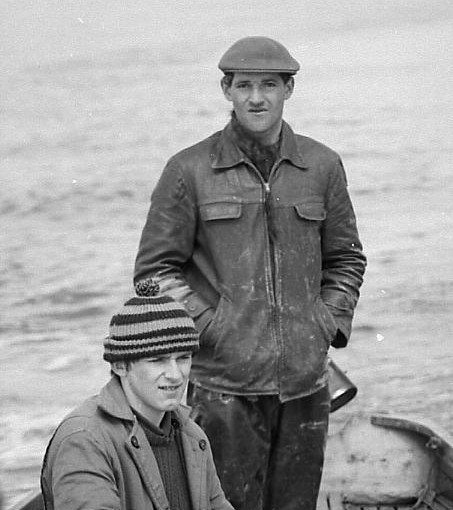Life in Post War Winchelsea
By Jimper
The world was in darkness the night I was born, not a light was to be seen, and then, as I grew and could walk and run, the lights came on all over the Kingdom.
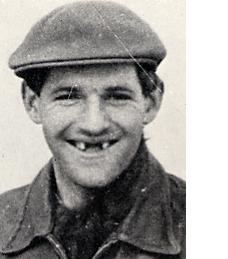
The war with Germany was over, the marsh was crying out for laughter and joy to return. Five years of war in the front line had left it scarred by ack-ack gun emplacements, trenches and pillboxes.
Many areas were out of bounds owing to minefields waiting to be cleared, but before then the top priority were the towns to be made safe, and there was still the War with Japan to win.
So off to school with me and make some friends to help explore this flat landscape that was given me as a birthright. I already had a little brother to play with. His name was Hugh and I shall never forget his first day at school.
He was met by mum and on the way home; another mother came up to her and asked what his name was, her child had made friends with him and told her he had no name so everybody called him who.
Our school had ninety-two kids, boys and girls there were three classrooms. The infants were taken by Mrs. Brakefield the wife of the local blacksmith, yes we still had a forge in those days, a real forge sparks and all, along with a petrol pump, a real good combination. We children stood for hours watching the smith hammer away at a red-hot piece of metal, but not for much longer, it closed with the coming of the cars.
He made anything, from door knockers, lambing crooks, thistle spuds, horseshoes, buckets, gates and even a chestnut roaster for mum, that I still have, and use in the log fire in the winter time.
There was a team of heavy draught horses kept by Mr. Walter Alford in the town. They were used to take down a huge horse chestnut tree outside the school and were looked after by old Tom Brown. The whole school was allowed to watch as the huge trunk that had had its boughs removed came crashing down. A long rope was tied to the top and the team of horses strained and pulled so the tree fell the right way. There were no chain saws in those days and two men swung axes amid a shower of wood chips.
Miss Bryant taught the middle class, I remember her whole classroom was lined with wooden bookshelves whose doors had black wire guards, and big boxes with iron clasps full of library books. These were changed regularly by East Sussex Education Department. The top class was the headmistress’ domain, Miss Smith, and woe betide you if things were not right. No noise, you could hear a butterfly flap its wings across the room.
All winter she stood with her back to the huge coal fire whose source of fuel us kids had to fetch from a shed round the back in coal scuttles. We never saw the fire or felt its warmth just Miss Smith. We were terrified of her; you had to learn everything by heart, your tables, mental arithmetic, poems, and the Lord’s Book, if you were not a Christian, we had three children in school that were not, so they had to go and sit in the lobby for the whole lesson and do something else. She with her big brass hand bell ran the school.
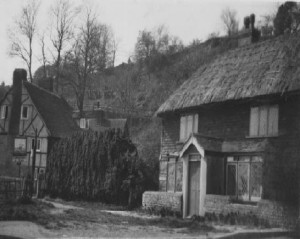
Keith a lad who we called Frisco, made friends with me on the first day at school and we were always together from that day on. He was a strong tall gangly lad who lived at the bottom of the hill only half a mile from where I lived. We had a lot in common; we both hated school and preferred to climb trees, or make mud dams in the spring across the road from his home.
His mother had little to say in the way he was brought up. His father had been a tank man in the war and was invalided out after the tank he was in had been blown up. He suffered a terrible head injury that was to kill him many years later. Meanwhile he ran his home with a rod of steel.
Frisco had an older sister a few years his senior so she did not figure in our life. We kept the town’s jackdaw population under control each year by collecting all the eggs from the hollow trees and high houses including the ancient church. He was like a spider the way he went up the stonework to return with his pockets and mouth full of eggs.
He lived in a row of very dark roomed houses as they only saw the sun for four months of the year because they were so close to the hill on the north side.
His grandpa kept a herd of Jersey cows, and supplied the milk for the town each day. Frisco kept all the inhabitants along his road supplied with eggs in the spring and from the age of five we would be far out on the marshes after school and at weekends, finding and collecting ‘Dabby’ eggs, that were really the eggs of the Moorhen. We had a hazel wand ten feet or so long with a spoon tied on one end, to get the half dozen or so little treasures from out of the nests.
If that was not long enough, then it was off with your togs and wade out. As the spring turned to summer the ditches turned a yellowish green owing to all the duckweed that covered the surface of the water. Then as we came out it used to stick to our bodies and was a hell of a job to remove. Before putting our clothes back on we stood facing each other and wiped the tiny scales of weed away with our hands.
One day some girls came and sat down to watch us wading in the ditch to gather a nest of eggs, so we had to stay in the water until they had gone. It was cold and we swore that we would get even with them some day.
At school Frisco and me had a well-kept secret. We had discovered out in the small room from our classroom which housed the big school bell hung up in its little tower, and the rope dangled nearly to the floor, there was a cupboard in which tins of water paint, and ink powder were kept. On the top shelf was a quantity of tins that held powdered milk. Now if me or Frisco were naughty we would be sent to this room for a period of time as punishment before getting one hundred lines to do at night back at home. No one knew our delight of being given a spell of confinement in that room. A little wet finger in that milk powder popped into a little mouth was heaven.
We had few luxuries in those days; we got nine pennies pocket money that was it. More money was of no use to us as all sweets were on ration and we only got nine-penny worth of coupons each week but we did not care; the sun and fields beckoned and that was our delight. Outside we had sheer freedom.
At lunch time the whole school closed, and Miss Smith locked the door. Then putting the huge key in her black handbag we all filed out the gate for the half mile walk to the new hall and lunch in a large crocodile fashion two abreast, lower class first second class next, and top class last and everyone got a hot lunch paid for by their parents at eight pence a week, which you had to pay into school on a Monday.
My little brother hated peas and all greens, and would never eat them. Luckily I would and still do eat anything to this day. He used to take a cough lozenge tin to school in his pocket and fill it with what he did not like; funnily enough he never got caught because the teachers were very strict about everything, even food; waste was not on the school curriculum.
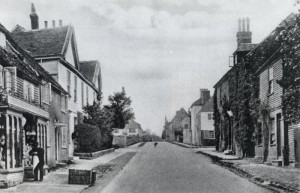
Every Thursday the whole school trooped across the road after register to the massive church opposite for a service. If it was a special saints day such as Ascension Day, we had to attend school for register then across to the church, after the service we were given the day off.
Another time, other than dinner, when we formed a crocodile was when we were marched from the school to see the dentist. One and all of us would have our teeth inspected. At other times we had a nurse come to school and then we had to file into the little room under the bell, and sit on a chair while the ‘nit nurse’ combed our hair for lice; they were rife in our day, not many kids failed to have them at one stage in their life.
Even after school you were not safe from Miss Smith; she had eyes and ears all around the town, she knew everything we did. One day I fell asleep in the middle of the A 259 road under the ancient town arch. It so happened that the Trojan van from the tea company Brook Bond came up the hill and seeing me asleep, the driver rather than wake me reversed down and went into town by the back hill which in those days was no better than a dirt track, (now it is the main trunk road.) Next day I was in big trouble; one of Miss Smith’s boys had blocked the road by his selfish act of going to sleep in the middle of the road. You try and lie down on the A259 today, for you take your life in your hands just crossing it. Oh for the days before cars and rushing everywhere.
Winchelsea was a live town in the fifties, unlike today. We had a policeman called Jack Simon. He rode a big heavy twin bar police bike and was always in his neat uniform with a huge domed helmet. This was the long arm of the law so we did our best not to be seen by him, but he was a good man and helped wherever he could, always having time to talk and listen. He learned more that way than any man in his profession today, always at our house, asking dad to keep an eye out for this or that as father was a fisherman, and attended the tides at all hours day and night. Jack had his finger on the pulse of the area; not only did he seek information, he gave a warning to keep an eye out for anything untowards.
His little wife was the soul of the town, always with her head in a headscarf; she was here, there, and everywhere doing the flowers in the church or helping do the school dinners at lunchtime. Crime did not exist in our part of the land you never locked anything up, the back door was always open in our house summer or winter it was safe, you never knew where he was on his bike; he was silent until you heard those dreaded words, ‘You Boys!’ Then you were for it; he always promised to tell your parents, and that threat hung over us poor kids for some time because if he told mum or dad, we would get a clout from our parents.
But most feared by us kids was the big man at the manor, who owned most of the land in and around Winchelsea. Another man not so much feared, but mysterious to us kids, was the vicar, Mr Cochran. We called him the Rook; he was a giant of a man dressed all in black apart from a pure white dog collar. In his large black cape he seemed to glide along, his feet hidden from view beneath the surplice that swept the ground. At the start of every school day he took us for prayers; his voice boomed but the worst aspect of him was his look, his eyes told you all. If it had come to his attention that you had overstepped the mark, his look sent you to hell non-stop.
We had a doctor who ran the local cottage hospital and also a butchers-come-fish shop run by Mr Lomas. The Lord of the Manor owned the shop.
Mr Lomas wore a blue and white apron and a straw hat. The outside of his shop was where he hung all his wares, half a pig, lamb, beef and mutton, real old sheep. The rabbits, hares, pheasant’s, partridge and duck were all displayed for you to see when in season. These animals were gutted and hung up by their back legs with a wooden peg to keep the flanks apart, so as to show off the fat around the kidneys, a sure sign that the rabbit was healthy.
Always there was a tame rabbit, white, black or red. People reared them in hutches in their back gardens and fed them on green stuff that grew alongside the roads. Every night you could see the town kids with their sacks picking and stuffing the dandelion, parsley and fresh grass into the bags to take home as rabbit fodder.
Mr Lomas also sold wet fish and my father sold him a lot. I remember he sold nineteen stone of herring to him in one day. Nowadays you are lucky to sell half a stone (seven pounds). No one cooks fish as it stinks the house out; nowadays most fish is bought in a plastic bag with a dollop of butter and herbs, and placed in the microwave until it goes ding. That is not the way to cook fish; the old frying pan is best but first you have to know how to cook it. These days, with mum not frying, the young girls grow into women not knowing what real fish is.
The general stores were around the corner. Us kids loved to go to this shop with mum as below the counter stood a line of biscuit tins revealing all sorts of fresh delights. At the end of the row would be a tin full of broken ones, and to make it more interesting the shopkeeper Mr. Finch always broke and mixed a few bourbons in the tin for us kids. The aroma of that shop with the smell of freshly ground coffee beans and smoked bacon still lingers with me to this day. He baked the coffee in the window in a tall red metal and glass container over the coffee mill.
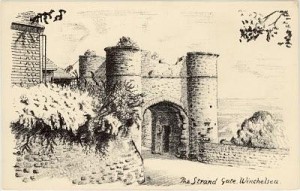
The fresh cured bacon hanging down in great slabs, the old red and silver hand turned bacon-slicing machine, the ham covered in golden bread crumbs on its china plinth. The shine on the brass weights belonging to the white enamelled scales, and the lovely marble set he weighed the cheese on, that my brother now owns in his shop. Always a chair for the customer to sit on, the assistant always got what you ordered; no self help in this shop. Everyone wore white aprons and a straw hat. If too much shopping was ordered then it was no trouble to deliver it; sugar was loose then and with a sheet of stiff blue paper, a funnel shaped bag was created. A quick twist of the hand, a fold here and there, and you had a ready made bag, no plastic in sight. The carrier bags were made of paper with a string handle. All the paper bags would have the name of the shop and telephone number on them. The butchers had a bull’s head printed on it. The grocer had a wedge of cheese and a pot of jam on his; they were little works of pure art. This shop also served as the post office. Everything was set out nice and tidy.
We had a general store that had started life as the cricket pavilion in Croydon, my father said he remembered it arriving in sections and Mr. Wren nailing it back together, and very good it was too with its corrugated iron roof; you could buy anything from paraffin, rubber boots, nails, screws, and potatoes, tinned fruit to fresh vegetables. The cheese used to come in one kind only, big, flat and round covered in a cloth. That is where the cat sat all day washing himself, until some one wanted a bit, then with a swipe of the arm the moggy vanished, only to return moments later to sit back on the cheese and carry on with his ablutions.
Anything that was well past its sell-by date and in those days meant smelled off or gone rotten, was swiftly despatched by the owner by throwing it across the road into the thick hedge of hawthorn and sloe bushes. All was hidden in the summer then every winter as the leaves dropped, that clump of bushes produced a lovely crop of onions, carrots and dried up oranges and cabbages.
Out the back under a lean-to was a row of wooden barrels; from these, if you took your own bottle, Mr. Pellet produced real malt vinegar, dark brown and very acid, good for fish and chips and pickling. Not a lot was needed I can tell you; no one died from the produce of this shop and many lived into very old age.
Next to them stood tin drums of kerosene for your heaters, every house in those days had an oil fire that turned the air into a distinctive smell, ours stood all winter in the hall giving its friendly little blue glow out from the neatly trimmed wick.
In the town we also had another large grocery shop run by the Barling Brothers, and one known as The Little Shop, run by Herby, a tiny man in stature who had very poor mobility and had to use two walking sticks to get around; but this did not stop him at the counter. Behind him there were shelves of glass sweet jars, that he was unable to reach with his hands so he used to hook his stick around the jar’s neck, and in one swift yank the jar fell into his hands and the walking stick hooked over his arm.
He never failed to catch the container but was unable to return the jar to the higher shelves, it was a running job for us kids after school to be the first into the shop and replace all the sweet jars back to their proper place. On a good day the poor little man could hardly move, the floor around him covered in jars and his counter stacked two high with the jars he was unable to replace. For doing this he always gave you a home-made lolly on a stick. His shop had a modern freezer, a rare thing in those days, and he made the lollies on sticks himself.
To us kids he was our favourite shopkeeper, always allowing us to look at the latest comic without buying it. His shop was very small, more a tobacconist and paper shop that sold sweets. It is now sadly the last shop in Winchelsea, and is run by the town as a general store.
Herby Sheppard was a local man related to others in the area, as most people were in those days, for people did not have the opportunity to travel as nowadays.
I knew an old man on the marsh who was over ninety and had never seen what lay over the hills surrounding Romney Marsh, for as he said, it is a day’s walk and another day back and I cannot afford to have two days off work to see something I can never have.
Another small man was Joe Marshall, he was the snob or shoe repairer, he did his repairs in a little shed again with a tin roof in his garden. In his young days he had driven sheep from Ashford in Kent to Heathfield market in Sussex, a trip of forty miles and thought nothing of it…One of his first jobs had been on a farm at Hamstreet that was owned by a local man and he had to walk the fifteen miles to work each day. His boss soon told him it was too far a walk, by the time he had done that he would not be of much use for a hard days work and to go and see Mr Brakefield and get a bike
There was the paper shop where we got our papers and sometimes a treat when mum paid the paper bill each week; that was where Nesbitt Garage is now.
There was another man us kids loved and that was Mr Curd. Every day he would dress up in his uniform and armed with his telescope, walk down to the lookout at the bottom of the High Street and see if the enemy was coming. This was a custom left over from the French invaders that ransacked and killed our men, raped the women and made of with the church bells, leaving the town in tatters. They did the same thing to our sister town of Rye but then there was enough men left alive to retaliate when they sailed to France and reclaimed their bells.
The lookout is a shelter overlooking Romney Marsh towards Maidstone and around the North Downs to Dover, and west from there across the bay to Fairlight. The shelter was lined with big elm planks and had a seat along the back and was a great meeting place for us kids, and old folk.
Carved on the wall there were long lists of names; we all added our names to the wall with our penknives. Even visitors added their names; it was a sort of record of who had visited. Now alas, kids of today use cans of spray paint to write obscenities over everything so most of the boards have been removed.
At the bottom of the hill lived Mr Brooks; what a character he was. With his clay pipe, he was the mile man, with his wheelbarrow, spade, broom, swop and paintbrush; he kept the town and roads first class. He painted road signs and gritted the hill with salt at the first hint of snow. It was said, that he had a free bus pass for anywhere on the East Kent buses, as a bus of theirs had never got into trouble on his length of road.
At the bridge to Rye over the River Brede stood a garage owned by Mr. Cole surrounded by massive elm trees. Across the road in Sea Road stood an old hand wound petrol pump with a glass one-gallon top but I cannot remember it in use; I understand that Mr Bull last used it before the war.
Along under the hill in Tanyard Lane where Frisco lived was the ash pit, or dust hole and sewage farm for the town. The allotments were also situated here. The dustcart was a three-ton wagon closed in with sliding doors on top each side.
Every Friday there was a W.I. sale in a garage in Castle Street, or on a trestle table out in the street if dry, where all the women folk sold what they had made the week before.
At school Miss Bryant ran a saving card club and we were all encouraged to save sixpence and were given a stamp to stick into our book. This could be redeemed later at the post office.
When we were only five or six years old, you would find us after school on a warm dry day along at the bridge on the A259 collecting car numbers into a book. In a good day we would hope to get two or three new ones; then at school next day we would swop them among the other avid collectors, no foreign cars in those days. Most numbers were three figures and letters nearly all ended in DY. This was the prefix for Hastings. I think it was an old AA handbook that we had. In it were all the prefix letters of the licensing areas, so one could immediately see what town the car had come from. To us any plate more than fifty miles away, caused a real stir. Was it a spy or secret agent? Our little minds ran wild with the excitement. Nowadays let’s just say I would not like to be the one to drive a flock of sheep along that road. To start with, I would not understand the foreign language of the overseas visitors, let alone the choice words from the more local drivers.
We were nothing but resourceful in those days. A bit of scrap metal or dig a few lug-worm and we had a bob or two. One day it was wet so we pooled our money and found out we had enough for some tobacco. Unknown to us, my mother had been eavesdropping, like mothers do when the kids get into a huddle in the front room. One of us was elected to go to Herbies, the local shop in the town, and get the fags. Mother bided her time, then when the elected one had gone, phoned the shop and arranged with Herbie that so and so was to be expected, and please serve him with the strongest, most evil tobacco that he had.
The Hearts of Oak weed eventually arrived home and we shut ourselves in the front room. Soon you could not see for the fog of our efforts. Mother opened the door and said that we all looked rather green. Of course not one of us was going to give in first, and we were all rather sick for the rest of the day. Some were never to smoke again but I like a fool still puff the wretched stuff fifty years on. Yet we survived and lived. There were very few rules for us to keep, unlike today. Us kids knew every flower, blade of grass, stone, fern and feather in every corner of every field, we were free.
You never see kids playing nowadays as we did. If you see any youngsters, it is either just their faces as they go by in cars with their parents, or walking in groups with a mobile phone stuck to their ears, all dressed up in the latest fashion. In my day you wore what you could get, always old and only two colours, grey or brown; a short pair of trousers, a jumper and on our shoulder a pet jackdaw for company; some of those birds could even talk and that was the closest we got to having a mobile phone.
In late April or early May, along the wood we went and knowing of a hollow tree that contained a jackdaw’s nest, we removed a chick that was nearly ready to fly. Taken home, we fed him on worms, bits of meat, bread and milk. Soon he was tame and looked on you as his parent, always meeting you with a “Jack.” His favourite perch would be on your head or shoulder. When we were out he would follow and be with you all day, disappearing for the odd hour or two to meet his cousins and do what jackdaws do. On his return he often bought a present of a tin foil milk bottle top or a bit of silver paper as a token. If you put it in your pocket, he never forgot where it was and days later would put his head in the pocket and get it out. Some of our pet birds actually talked a few words.
I had one that used to come to school with me and waited all day outside. Then when I left in the afternoon, he swooped down frightening the girls with a call of ‘Jack’ to my “Here boy.” I had that bird for three years, then one day he left in March, and took up with a mate in the town. Once or twice he landed on me in the street but would not let me touch him. He had gone back to the wild. I was glad that he had found a mate and every day on my wanders, fancied that he was among the crows flying over me out on the marsh.
Never far, always within three miles of home, we covered a lot of ground. Our parents never really knew what we were up to but they always had an idea where we were because in my younger days, all the fields had a name, most going back centuries; and mum always asked were we were going, now sadly field names are known to but a few of the old boys. The farmer of to-day has turned many a small acreage into a huge track of land by filling dicks in and grubbing up the old sloe bushes, that the sheep used to cling to in bad weather for a bit of shelter.
And anyway, why bother with a piddly little name when you can looker all the sheep in one hour in a motor vehicle, while talking on a mobile. Names like the Innings, Carrot Field, Roman Wall, Sankies, Mackys, Wet Top, Bent Corner, Annies or The Run, all meant a specific spot on God’s earth to us. Now it is just out on the marsh where you can see my land rover or meet you back at the farm in ten minutes. Half an hour in our days meant perhaps only two thousand yards dodging across bridges and through gates on foot.
Now even most of the old oak gates are gone, to be replaced by metal hurdles carried on the back of your transport. And as for all those lovely wonky planks that we called bridges that spanned the ditches, that saved you miles walking to every gate, alas they have rotted away and disappeared many years ago, or were pulled up so that no-one would trespass on the new farmer’s land.
Signposts now stand stark and far seeing across the land to tell you where you may walk and where you are going. Paths are marked and are to be adhered to. Not in my day they weren’t, we roamed where we wanted. If we found a sheep in trouble, we helped. We pulled them from the ditches, turned the overlaid ewe back onto its feet, put lambs back to the right side of the ditch if they had gone wrong. It mattered not a jot to us whose it was. To us it was an animal in trouble. We saw the farmer or looker or told dad, so he could tell the owner and he could check the next time he went around. We did a lot of things just to please our parents. We were small and nearly every dick had high reeds growing in them so enclosing us kids to a small world of our own, each field was different in size and each one had a part to play in the farmers program of field management and each held another surprise crossing a plank bridge you would find another play ground or someone working and we all knew each other.
You seldom see workmen now on the fields with their trousers tied up with a garter of string, because the farm workers now seldom place their feet on the soil. Everything is done on a machine. I know of men today who plough, sow, and reap over five hundred acre or more and never leave the cab. There are no gates to open and no fences. There is no way the present farmers could go back to keeping animals like their fathers did. They just could not afford to replace the miles of stock proof fences, and gates and anyway he who wished to have sheep, would be immediately under pressure from the corn barons who want the water table to be low to enable them to run their five ton machines on their land twelve months a year.
The sheep farmer likes a bit of water to keep the grass growing and water the stock. The old sloe bush has been
pulled up the ditches piped, the old grips ploughed up that were so laboriously dug by hand to drain the water. The whole area has been tile drained to increase the small field into the prairies they are today. These old sloe bushes once supplied a bit of shelter for the Romney sheep that have now gone from a lot of the marsh
I am very lucky that most of what I call My Marsh is in one ownership and the family are devoted to the Kent sheep so little of my part of the marsh has changed, it is still down to ancient turf, although nearly all the dykes are bare of the lovely common reed (Phragmites) that we used to thatch the hay and straw stakes with. It grew in such profusion that eventually it would choke the water’s flow, consequently the drainage board hired helicopters to the fly the winding dykes and spray the new growth in the spring, so killing it with the lethal spray, now with clear water there
are no reeds for the reed warbler to nest in, he was the main host to the cuckoo on the marsh now he is a rare visitor keeping himself to the fringe and trees were other birds to his liking live, the wettest fields have been tile drained and all the tussocks of hard rush have gone the way of the dick reeds.
Gone now are the days when mum asked the kids to get half a dozen eggs, which then meant going outside and finding six eggs in the hay in the hen house, or searching the stacks in the yard and under the hedges for the wayward hens’ nests. As the hen left her nest place, she would announce her achievement by clucking. This was always noted and a search often revealed a hidden clutch.
Taking the suspect eggs indoors, we then tested them by putting the eggs into a bowl of water. Eggs laying flat were fresh. Eggs that stood up on their pointed end were suspect, depending on how much they rose from the bottom, and would be broken into a cup first and given a good sniff, to see if they were past their sell by date. Any that actually floated were lobbed as far as possible downwind and woe betide any that the dog found broken, and rolled in because then mum would have our guts for garters.
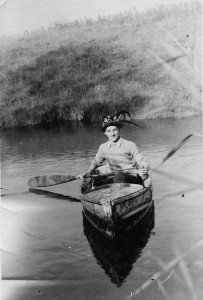
“Rye’s Own” April 2010
All articles, photographs and drawings on this web site are World Copyright Protected. No reproduction for publication without prior arrangement. © World Copyright 2015 Cinque Ports Magazines Rye Ltd., Guinea Hall Lodge Sellindge TN25 6EG
